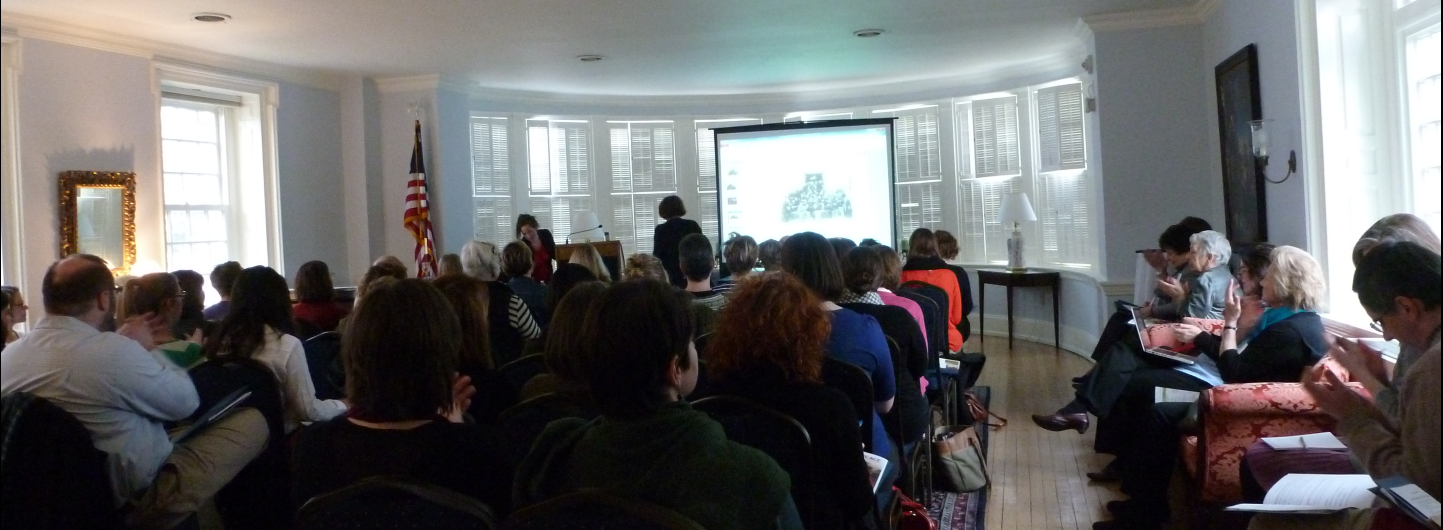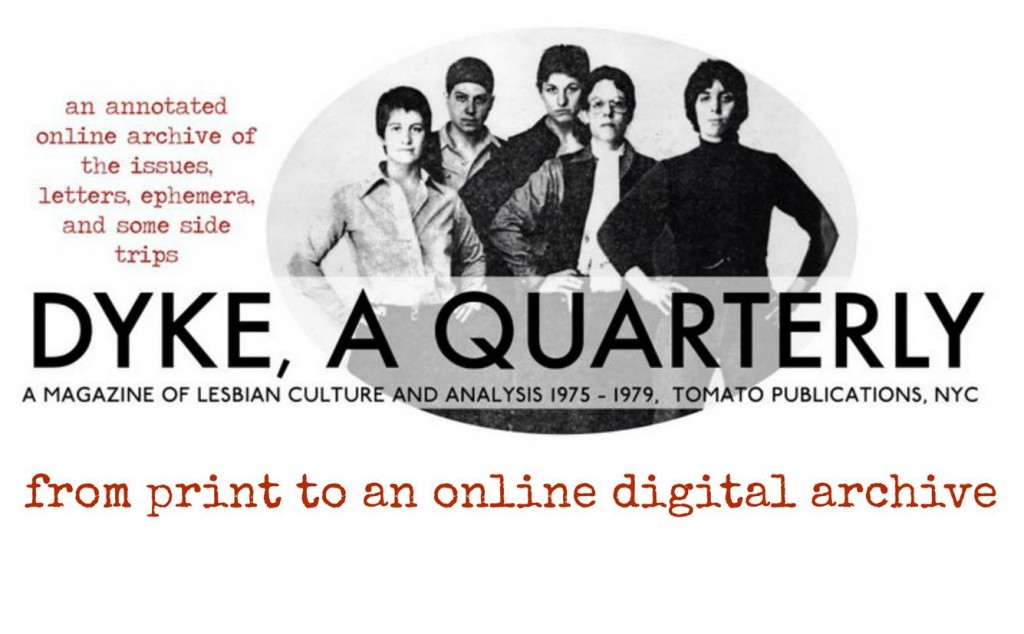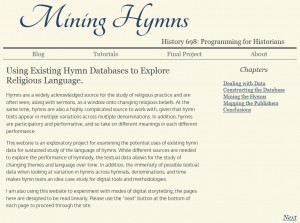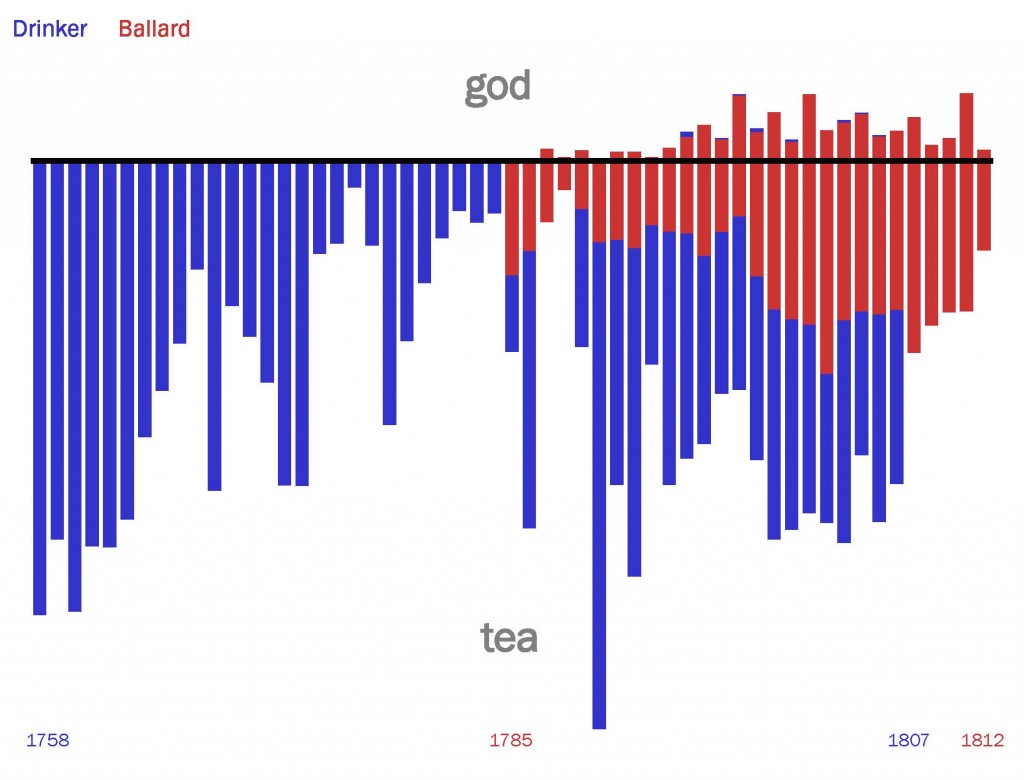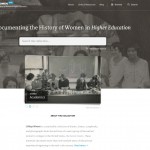 The October talk featuring Greenfield Director Monica Mercado, Rachel Appel (Bryn Mawr College Digital Collections Librarian) and Joanna DiPasquale (Vassar College Digital Initiatives Librarian) is now online via The University of British Columbia Open Collections. “College Women: A Collaborative, Cross-Institutional Archives Portal” begins at 00:14:50.
The October talk featuring Greenfield Director Monica Mercado, Rachel Appel (Bryn Mawr College Digital Collections Librarian) and Joanna DiPasquale (Vassar College Digital Initiatives Librarian) is now online via The University of British Columbia Open Collections. “College Women: A Collaborative, Cross-Institutional Archives Portal” begins at 00:14:50.
Tag Archives: Conference
“Teaching History through Archives” at AHA 2016
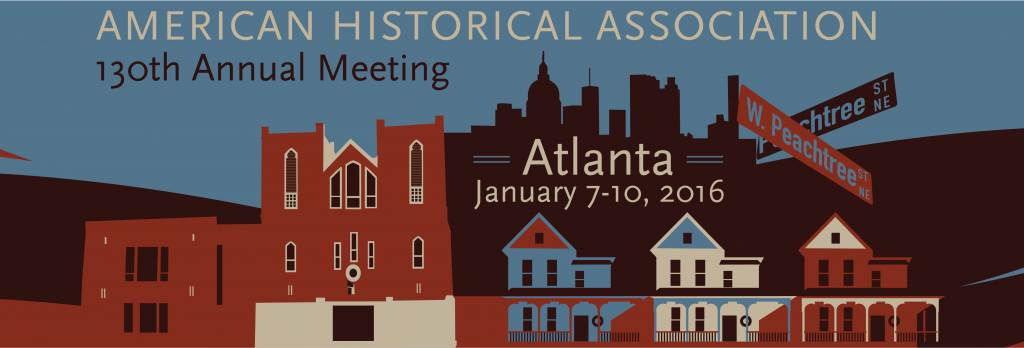 Going to AHA 2016? Greenfield Director Monica Mercado will be co-chairing the Committee on Women Historians mentoring/brainstorming session on Saturday, January 9, and later that day will be speaking about Bryn Mawr College projects on the panel “Teaching History through Archives.” Her paper, “Archives Praxis: Supporting Independent Study and Experiential Learning in Special Collections,” will detail student work including “Black at Bryn Mawr” and “We Are/We Have Always Been,” initiated by undergraduate student researchers:
Going to AHA 2016? Greenfield Director Monica Mercado will be co-chairing the Committee on Women Historians mentoring/brainstorming session on Saturday, January 9, and later that day will be speaking about Bryn Mawr College projects on the panel “Teaching History through Archives.” Her paper, “Archives Praxis: Supporting Independent Study and Experiential Learning in Special Collections,” will detail student work including “Black at Bryn Mawr” and “We Are/We Have Always Been,” initiated by undergraduate student researchers:
For more on the conference, follow the #AHA16 Twitter stream or search the online program.
‘College Women’ Goes West: DLF Forum 2015
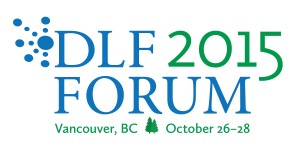 We’re in beautiful Vancouver, BC this week for the Digital Library Federation Forum. On Tuesday afternoon, Greenfield Director Monica Mercado, Bryn Mawr College digital collections librarian Rachel Appel, and Vassar College Libraries digital initiatives librarian Joanna DiPasquale will be presenting a project update on our archives portal, College Women: Documenting the History of Women in Higher Education.
We’re in beautiful Vancouver, BC this week for the Digital Library Federation Forum. On Tuesday afternoon, Greenfield Director Monica Mercado, Bryn Mawr College digital collections librarian Rachel Appel, and Vassar College Libraries digital initiatives librarian Joanna DiPasquale will be presenting a project update on our archives portal, College Women: Documenting the History of Women in Higher Education.
There’s a few ways to follow along:
- At DLF? Join our session in Ballroom I [Sched link here].
- Twitter: #DLFforum
- Crowdsourced note taking: Google Docs
- Livestream (starting at 1:30 PDT, 4:30 EST): sign up to receive login information.
We’re looking forward to presenting with the University of Virginia Scholars Lab project Take Back the Archive, a public history project created by UVa faculty, students, librarians, and archivists to “preserve, visualize, and contextualize the history of rape and sexual violence at UVa, honoring individual stories and documenting systemic issues and trends.” How can digital women’s archives work together and share in other conversations after we return to Bryn Mawr?
Greenfield on the Road: Fall 2015
Featured
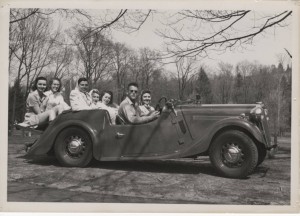
Students Take a Drive, ca. 1940s, Mount Holyoke Archives and Special Collections via our new archives portal, collegewomen.org.
With the Fall semester underway, I’ve been scheduling travels to share our work with digital women’s history and women’s education archives with colleagues around North America, and right here on Bryn Mawr’s campus. If you’re attending one of the following events, do introduce yourself – it’s a pleasure to share our collaborative work in women’s education history with new colleagues and old friends. [Unfortunately, my rental car doesn’t look half as snazzy as the one Mount Holyoke students took for a spin on collegewomen.org!]
September 19, 2015 | UNYWHO (Upstate NY Women’s History Organization)
“Digital Histories of Women: Projects and Possibilities”
Geneva, NY
September 30, 2015 | Bryn Mawr College Pensby Center Diversity Conversations
“Black at Bryn Mawr: What’s Next?”
Bryn Mawr, PA
October 27, 2015 | DLF Forum
“College Women: A Collaborative Cross-Institutional Archives Portal” (co-presenting with Rachel Appel and Joanna DiPasquale)
Vancouver, British Columbia
January 9, 2016 | American Historical Association Annual Meeting
“Archives Praxis: Supporting Independent Study and Experiential Learning in Special Collections” as part of the panel Teaching History Through Archives.
Atlanta, GA
In the meantime, you can also find me walking campus as part of the Black at Bryn Mawr project, which has two upcoming public walking tours: Saturday, October 3 at 2:30 pm (as part of Bryn Mawr College alumnae volunteer summit) and Friday, October 23 at 2:00pm (as part of Bryn Mawr College Family Weekend). These tours meet in front of Thomas, rain or shine, and all are welcome. Spring 2016 tours, including one during Reunion weekend, will be listed on the website when they are scheduled, so stay tuned!
Women’s History in the Digital World 2015: Register now!
Featured
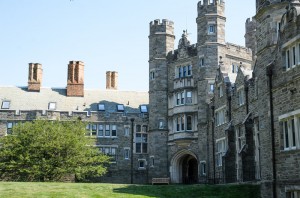
Join us at Bryn Mawr College, May 21-22, 2015! Campus photography via Bryn Mawr College Communications.
Women’s History in the Digital World 2015, the second conference of The Albert M. Greenfield Digital Center for the History of Women’s Education, will be held on the campus of Bryn Mawr College on May 21-22. We aim to bring together experts, novices, and all those in between to share insights, lessons, and resources for the many projects emerging at the crossroads of history, the digital humanities, and women’s and gender studies.
The conference will open Thursday, May 21 with afternoon sessions and a keynote address, followed by a full day of panels scheduled for Friday, May 22. Claire Bond Potter, Professor of History and Co-Director of the Humanities Action Lab at The New School for Public Engagement, will give the conference keynote address at 4:30pm on Thursday, entitled “Putting the Humanities In Action: Why We Are All Digital Humanists, and Why That Needs to Be A Feminist Project.”
A draft program for the two days is now available as a PDF [updated 5/7/15]. We are thrilled to host more than seventy presenters, representing projects from the U.S., Canada, Europe, Asia, and the Middle East.
“Can DH Answer Our Questions?” Looking Ahead to AHA 2015
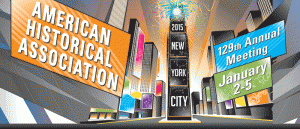 It’s finals week at Bryn Mawr, which means that campus is getting quieter by the day. But for historians like me, the December break also requires getting ready for the American Historical Association (AHA) annual meeting, held the first weekend of the new year. On Sunday, January 4, I’ll be chairing a fantastic session organized by Penn State graduate student Kathryn Falvo, featuring work at the intersection of women’s and gender history and the digital humanities. We’ll be joined by new University of Virginia Ph.D. Tamika Richeson, and Dr. Wendy E. Chmielewski, George Cooley Curator of the Swarthmore College Peace Collection. Set your alarm clocks: we’re scheduled for a 9am start, discussing topics central to the Greenfield Digital Center’s mission:
It’s finals week at Bryn Mawr, which means that campus is getting quieter by the day. But for historians like me, the December break also requires getting ready for the American Historical Association (AHA) annual meeting, held the first weekend of the new year. On Sunday, January 4, I’ll be chairing a fantastic session organized by Penn State graduate student Kathryn Falvo, featuring work at the intersection of women’s and gender history and the digital humanities. We’ll be joined by new University of Virginia Ph.D. Tamika Richeson, and Dr. Wendy E. Chmielewski, George Cooley Curator of the Swarthmore College Peace Collection. Set your alarm clocks: we’re scheduled for a 9am start, discussing topics central to the Greenfield Digital Center’s mission:
AHA Session 159: Can DH Answer Our Questions? Using Digital Humanities to Address the Concerns of Feminist Historians
Reflecting on her work on women who ran for office prior to 1920, Wendy Chmielewski questions the gendered aspects of digital research and presentation. Does digital research help scholars craft better or more complex questions about our historical subjects or create a different historiography? As a digitized medium becomes standard, questions of methodology, funding, and presentation are of the utmost importance. Tamika Richeson’s presentation will explore a DH project she has been working on that uses Omeka and Neatline to look at over 450 arrests of black women in Washington D.C. from 1830-1867. Tamika is concerned with placing these black women’s arrests in a larger digital narrative – one which can help historians access the lives of lower class black women in a way that traditional methodologies cannot. Similarly, Kathryn Falvo examines the lives of traveling Quaker women in the nineteenth century by using another mapping tool, ArchGIS. By tracing these women’s lives through their movements, we can better understand the role of female ministers within the Society of Friends and their lived experience as ministers. Here, too, mapping technologies facilitate an understanding of lived experience that more traditional methodologies cannot accommodate. Can DH methods accommodate the questions that feminist historians seek to answer?
![]() Our session is just one piece of a terrific slate of digital history opportunities at this year’s AHA, and I’m looking forward to a long weekend of good conversation and learning about new projects and tools.The conference has a brand-new smartphone app that will guide users to all things digital (check out the snappy logo, left). And if you’re planning to be in New York, there are still opportunities to present and meet outside of the formal panels: one of the first receptions of the conference is the now-annual reception for history bloggers and #twitterstorians on Friday, January 2, and the AHA recently posted a call for Digital “Lightning Rounds” on Saturday, January 3.
Our session is just one piece of a terrific slate of digital history opportunities at this year’s AHA, and I’m looking forward to a long weekend of good conversation and learning about new projects and tools.The conference has a brand-new smartphone app that will guide users to all things digital (check out the snappy logo, left). And if you’re planning to be in New York, there are still opportunities to present and meet outside of the formal panels: one of the first receptions of the conference is the now-annual reception for history bloggers and #twitterstorians on Friday, January 2, and the AHA recently posted a call for Digital “Lightning Rounds” on Saturday, January 3.
But there’s more!
With the support of AHA Director of Scholarly Communication and Digital Initiatives Seth Denbo, and historian Claire Bond Potter at The New School for Social Engagement, at the conclusion of the meeting we’ll be gathering for THATCamp AHA on Tuesday, January 6. Along with co-organizers Dan Royles and Shane Landrum, I’m excited to welcome both digital history veterans and newcomers to The New School for a day of unconferencing that will include a handful of prescheduled workshops on topics ranging from social media to social justice. Slots for THATCamp are filling up quickly–register here!
* * *
Speaking of conferences, we’re also busy these days on the receiving end of paper and panel proposals for the Greenfield Digital Center’s next conference, Women’s History in the Digital World, scheduled for May 21-22, 2015. The deadline for submitting a proposal is one month away — Friday, January 16 — so do contact the Center via email, leave a comment below, or catch me at AHA if you have questions or ideas (find our CFP, here). Can DH answer our questions? We’ll have lots of opportunities in the coming months to find out.
Call for Papers: Women’s History in the Digital World 2015
Featured
Women’s History in the Digital World 2015, the second conference of The Albert M. Greenfield Digital Center for the History of Women’s Education, will be held on the campus of Bryn Mawr College on May 21-22.
We aim to bring together experts, novices, and all those in between to share insights, lessons, and resources for the many projects emerging at the crossroads of history, the digital humanities, and women’s and gender studies. Continuing a conversation begun at our inaugural meeting in 2013, the conference will feature the work of librarians and archivists, faculty, students, and other stakeholders in the development of women’s and gender histories within digital scholarship.
The conference will feature a keynote address by Claire Bond Potter, Professor of History and Co-Director of the Humanities Action Lab at The New School for Public Engagement.
Panels will be scheduled during the afternoon on Thursday, May 21, and on Friday, May 22; a projects showcase and digital lab will offer opportunities for unstructured conversation and demonstrations.
We invite individual papers or full panel proposals on women’s and gender history projects with a digital component, investigating the complexities of creating, managing, researching and/or teaching with digital resources and digitized materials.
All thematic areas, geographies, and time periods are welcome: this is a chance to share knowledge, network, and promote collaborations that locate new possibilities.
To submit a proposal, please send the following information by email to greenfieldhwe@brynmawr.edu:
- complete contact information including current email and institutional affiliation, if any;
- short (150-200 word) biography for each presenter; and
- abstract (s) of the proposed presentation (500 words for single paper, poster, or demonstration, or 1,500-2000 words for panels of 3 papers)
The deadline for submissions is Friday, January 16, 2015.
For updates, follow the Greenfield Digital Center on Twitter @GreenfieldHWE and the conference hashtag, #WHDigWrld15.
* * *
Women’s History in the Digital World is organized by The Albert M. Greenfield Digital Center for the History of Women’s Education with the support of Bryn Mawr College Libraries and The Gladys Krieble Delmas Foundation.
Thoughts on feminism, digital humanities and women’s history
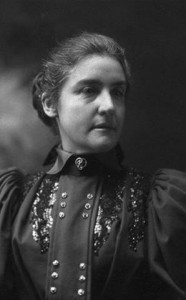
M. Carey Thomas, Bryn Mawr College’s first female president, is the subject of a new digital exhibit to be launched soon
I have been exploring my thoughts on women’s history, digital humanities, and feminism through two separate presentations in recent months, the first at the conference organized by The Albert M. Greenfield Digital Center for the History of Women’s Education, Women’s History in the Digital World (March 2013), and the second at the Five Colleges Mediating Public Spheres: Genealogies of Feminist Knowledge in the Digital Age conference (April 2013). In a presentation at the latter conference, titled Open Source Technology and Feminist Perspectives: Translating Sources on the History of Women’s Education to the Digital Age I explained my feminist approach to my work at the Digital Center, focusing on a digital exhibit on M. Carey Thomas that is underway and will be launched soon. This blog post represents a synthesis of the two papers, based on work and thoughts in progress… all comments and feedback welcome as I work through some of the concepts I’ve been grappling with.
My thoughts on the trifecta of feminism, digital humanities and women’s history are largely drawn from my experiences using the open source software platform, Omeka, and our institutional enterprise version of Word Press to populate different areas of the Digital Center’s site, in addition to my training as a CLIR Postdoctoral Fellow. While I assume that neither of these tools were designed with feminist notions in mind, I’ve come to believe that they have large potential to be utilized for feminist outcomes, particularly Omeka, as I will explain further in this post. Primarily, the Center’s site aims to tell stories in the history of women’s education that emanate from different perspectives. As Hermione Lee has said in her collection Virginia Woolf’s Nose: Essays on Biography, “We all want stories”, and the demand for such stories in the digital age is no less (possibly more, in fact) than ever before.[1]
The digital age and the tools it provides allow for a different mediation of knowledge than standard forms of scholarly communications. As noted by Abby Smith Rumsey these new methods have brought “fundamental operational changes and epistemological challenges [that] generate new possibilities for analysis, presentation, and reach into new audiences”.[2] The exhibit format in Omeka is designed to allow for the easy presentation of original historical material, such as images, transcriptions and audio files. This allows for the greater sharing of primary source materials, itself a way to decolonize and break down barriers to research and access to rare materials. We have created a number of exhibitions on our site, some of which have been generated as a result of student work from a class I teach on the history of women’s education, some of which come from collaborations with other colleges, and some drawn from our own collections and created by me and my team (see here for the full range of exhibits we have developed so far).
Our endeavor to produce digital source material comes from a desire to transmit knowledge and awareness of women’s history to the broadest audience possible: fellow researchers, students, teachers, alumnae, digital humanists and those simply with a desire to learn more about the topic–in essence, the public sphere has expanded in the digital age, although there are still challenges to be faced in greater online access morphing into another form of the ‘digital divide’.
Upon learning the new software platform and becoming familiar with its characteristics, possibilities and constraints, I realized that the Omeka exhibit format allows for the subject matter to be presented in a deconstructed narrative, due to the free form it provides for creating the digital exhibit. This struck me as having strong feminist potential: while the structure allowed by the Omeka format is cohesive in terms of form and flow, the sectioning of a biographical narrative allows for the fragmentation of the story, and in my efforts, for the development of a kaleidoscopic view, or, to paraphrase Henry James, to let the “swarm of possibilities” that nebulously make up a person’s biography to emerge, rather than a “few estimated and cherished things”.[3] This is, in my view, one of the pivotal means by which to incorporate digital media in feminist scholarship and practice.
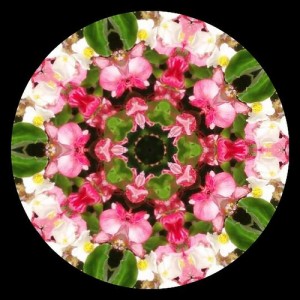
Image by klmontgomery licensed under a Creative Commons license and available here http://www.flickr.com/photos/klm_digital_snaps/1444968874/sizes/m/in/photostream/
In a feminist postmodern tradition, this approach posits that there is no ONE person for us to study, no One Truth we can ascribe to a person or their life history. In this case, M. Carey Thomas, born in Baltimore, Maryland on January 2, 1857 to a prominent Quaker family. Thomas was the first Dean and later the first female President of Bryn Mawr College and a national leader in women’s struggle for access to higher education and the suffrage movement. My feminist approach to her biography aims to be cognizant of the privilege in stories such as hers: the history of women’s entry into higher education is an elite history, and recognition of this is necessary so that the histories we tell are not merely celebratory without being interrogative.
Here I am focusing on Thomas as she was seen from different perspectives: her own (for example, her ambitious articulations for her education and career in the letters and diaries that span her time at Quaker boarding school, on to Cornell, Johns Hopkins and eventually a summa cum laude PhD from the University of Zurich), those of her contemporaries, lovers, friends and family, the public and the way in which she was memorialized after her death in 1935. I am focused here, however, not on the details of her biography (although this will be in the exhibit) but rather on examining the potential of an open source software tool to present critical historical analysis of this fascinating person. The ability to juxtapose different opinions by placing them on the same page is more visually and comprehensively impactful in a digital exhibition format than would be the effect of a written paragraph: in traditional biographical accounts such as an article or monograph, editorial and stylistic conventions would view such jumping around as incoherent, and yet it can be seamless in an online presentation.
Making sure our metadata is harvested by the major search engines and databases and using social media to reach both scholarly and public audiences will both be crucial in building up a new body of feminist genealogies and for tracing feminist work in the digital era. The metadata itself also needs to be cognizant of feminist principles in describing women’s identities in digital databases, as was mentioned by Professor Laura Mandell in her keynote speech at the Women’s History in the Digital World conference.
It is also imperative that as we do work that mediates the public sphere in the digital age we think about its long term preservation. This requires that choices be made, funding be sourced and policies be formulated now – it would be the greatest tragedy of all if we found ourselves unable to trace back the exciting developments in feminist work that have been produced in online public spaces. The familiar academic mantra of ‘publish or perish’ might be usefully adapted in this context to be ‘archive or perish’. And, as I remarked at the Women’s History in the Digital World conference that was held at Bryn Mawr College, I believe fundamentally in the idea that the ‘add women and stir model’ for any kind of initiative, social, political education or anything else, rarely works.
In the new era of digital humanities, women need a seat at the table while it’s still being set, not after the main course has been served. As I researched for this paper, I discovered that others in the digital humanities community have also used the “table” to describe the need to collaborate, critique and engage in new developments. Alan Liu has argued that digital humanists need to be equal partners at the table, not just a servant, when critical conversations are happening about the way forward for the humanities and cautions that digital humanists need to include more cultural critique in their work.[5] Moya Bailey extends Liu’s concerns into more explicitly feminist territory with her arguments that the “ways in which identities inform both theory and practice in digital humanities have been largely overlooked” and that moving from “the margin to the center” gives the opportunity to “engage new sets of theoretical questions that expose explicit structural limitations that are the inevitable result of an unexamined identity politics of whiteness, masculinity and ablebodiness”.[6] Alan Liu’s point was that the “digital humanities have a special role to play today in helping the humanities communicate in contemporary media networks”.[7] I would extend this argument to say that feminists have a special role in mediating the present and future public spheres, through their research, pedagogy and activism. Here the words of M. Carey Thomas are apt: reflecting on the success women had made of educational attainment in the first twenty-five years of the Association of Collegiate Alumnae, she stated “The fearsome toads of those early prophecies are turning into pearls of purest radiance before our very eyes.”[8] Let’s hope it’s the same for us as we feminists navigate the new public spheres and create our own genealogies of knowledge.
[1][1] Hermione Lee, Virginia Woolf’s Nose: Essays on Biography, Princeton University Press: Princeton, 2005: 1.
[2] Smith Rumsey , New-Model Scholarly Communication: Road Map for Change (2011: 2).
[3] As quoted in Hermione Lee, Virginia Woolf’s Nose: Essays on Biography, Princeton University Press: Princeton, 2005: 1.
[4] Anne Balsamo, Designing Culture: The Technological Imagination at Work, Duke University Press: 2011: 51.
[5] Alan Liu, ‘Where is Cultural Criticsim in the Digital Humanities?’ available from http://liu.english.ucsb.edu/where-is-cultural-criticism-in-the-digital-humanities/
[6] Moya Z. Bailey, ‘All the Digital Humanists Are White, All the Nerds Are Men, but Some of Us Are Brave’, Journal of Digital Humanities, Vol. 1, No. 1 Winter 2011, available from http://journalofdigitalhumanities.org/1-1/all-the-digital-humanists-are-white-all-the-nerds-are-men-but-some-of-us-are-brave-by-moya-z-bailey/
[7] Alan Liu, ‘Where is Cultural Criticsim’.
[8] Thomas, Women’s College and University Education: Address delivered at Quarter-Centennial Meeting of the Association of Collegiate Alumnae, Boston, November 6, 1907.
Available in digital form on the website of The Albert M. Greenfield Digital Center for the History of Women’s Education by clicking here. You can view the original by visiting Special Collections, Bryn Mawr College.
Conference Presentations Available Online: Women’s History in the Digital World Repository
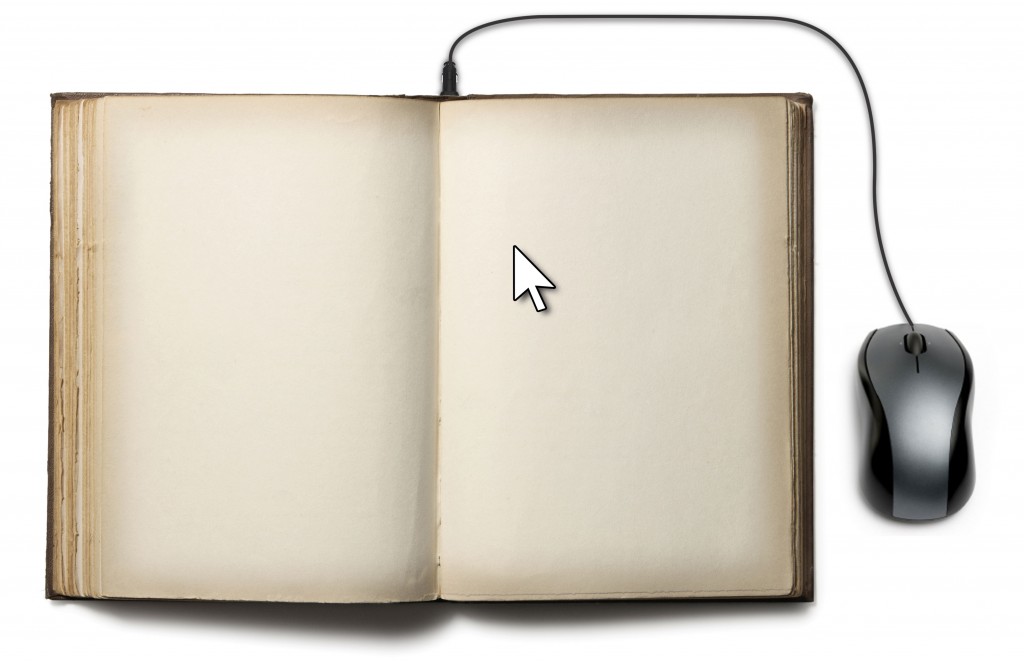 On March 22nd and 23rd, 2013, a compelling group gathered for the Women’s History in the Digital World conference to discuss an array of the fascinating projects that are emerging at the crossroads of the digital humanities and women’s and gender studies. The conference sparked dialogues across both the physical and the digital realms, as animated exchanges took place on Twitter alongside those that were ignited in person (viewable as a Storify of tweets using the conference hashtag, #WHDigWrld, thanks to the creative ‘wordsmithing’ of presenter Michelle Moravec). One of the most exciting outcomes of the event is the extension of those conversations beyond the spaces in which they originated: we are now looking to gather the presentations from the weekend in the form of speaking notes, slides, links to project and social media pages and other supplementary materials, to make them available to all on our conference website. For the many who were not able to attend in person, this resource will provide an opportunity to engage with the work and see the variety of research endeavors that are currently underway in the field. For those who were present, the repository offers a new chance to view presentations that conflicted with other panels, or to revisit work that may have stirred thoughts that called for deeper inquiry. We hope that the site will serve to sustain the conversations that emerged at the conference, as well as foster new dialogues with a wider participatory base than those who were able to convene in March.
On March 22nd and 23rd, 2013, a compelling group gathered for the Women’s History in the Digital World conference to discuss an array of the fascinating projects that are emerging at the crossroads of the digital humanities and women’s and gender studies. The conference sparked dialogues across both the physical and the digital realms, as animated exchanges took place on Twitter alongside those that were ignited in person (viewable as a Storify of tweets using the conference hashtag, #WHDigWrld, thanks to the creative ‘wordsmithing’ of presenter Michelle Moravec). One of the most exciting outcomes of the event is the extension of those conversations beyond the spaces in which they originated: we are now looking to gather the presentations from the weekend in the form of speaking notes, slides, links to project and social media pages and other supplementary materials, to make them available to all on our conference website. For the many who were not able to attend in person, this resource will provide an opportunity to engage with the work and see the variety of research endeavors that are currently underway in the field. For those who were present, the repository offers a new chance to view presentations that conflicted with other panels, or to revisit work that may have stirred thoughts that called for deeper inquiry. We hope that the site will serve to sustain the conversations that emerged at the conference, as well as foster new dialogues with a wider participatory base than those who were able to convene in March.
Several participants have already sent in their materials. In addition to the abstracts and bios we have uploaded the conference related materials we have been given so far. You can search all of this material on the conference website using the search box in the upper right hand side as seen in the screen shot below. 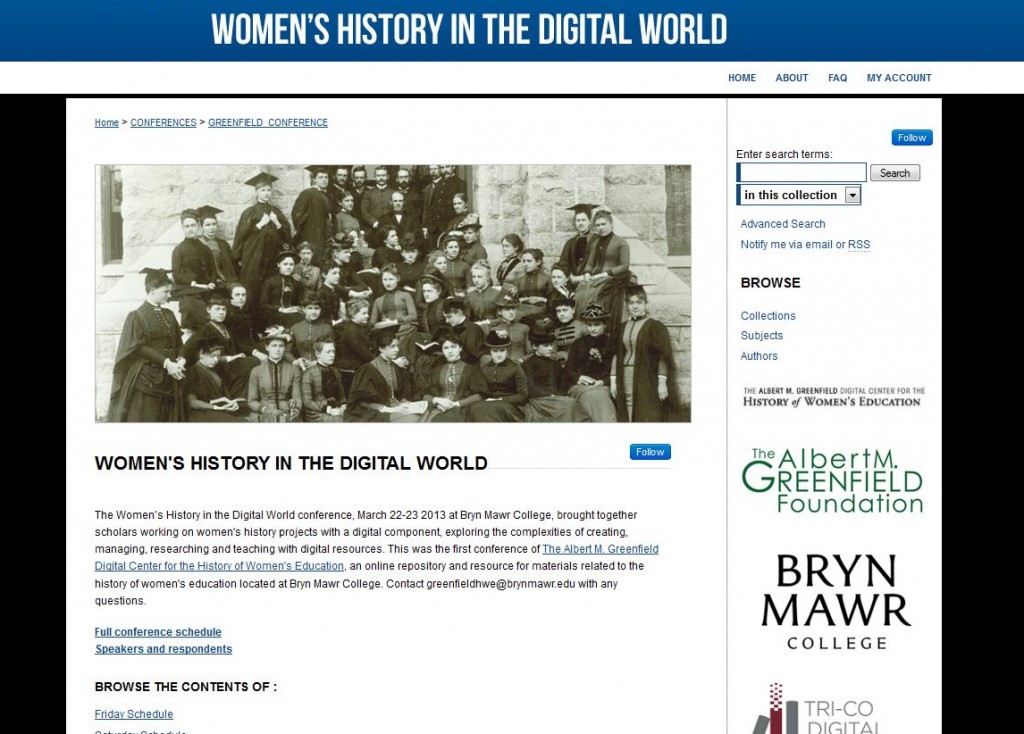
The conference repository can be searched by keyword, presenter name, institution etc., whatever term you would like to use to draw together material from the many different conference presentations. We encourage all presenters to send us their materials – you will not be able to upload the documents yourself, this must be done by us.
Update: presentations with materials uploaded are now marked on the Saturday schedule with a red “presentation available” indicator to make browsing easy.
Among the work that has been uploaded so far are the presentations on DYKE, A Quarterly: Blogging an Online Annotated Archive; Mining Hymns: Exploring Gendered Patterns in Religious Language; Digital Diaries, Digital Tools: A Comparative Approach to Eighteenth-Century Women’s History; and The New Hampshire Historic Dress Project. These and others can be found on the conference site as described above, or you may click the images below to view the materials directly.
Many thanks to those who have shared their work in this open access forum. If you participated and would like to make your presentation materials in any form available to the public, please send them to greenfieldhwe@brynmawr.edu and we will make sure to post them for you! Don’t forget to include your website and/or social media information. You may direct questions to our Director, Jennifer Redmond, at jredmond@brynmawr.edu. Or find us on Twitter @Greenfield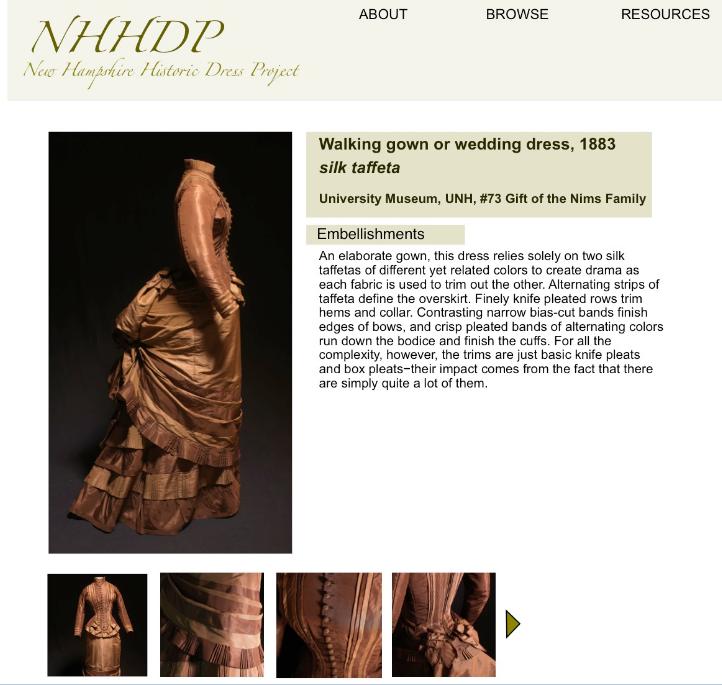 HWE
HWE
‘Women’s History in the Digital World’ Conference 2013: Vibrant and Absorbing Conversations on Women’s History
The Albert M. Greenfield Digital Center for the History of Women’s Education held its first major conference, examining issues in women’s history, gendered analysis, technology and the digital humanities on Friday and Saturday, March 22-23, 2013. Almost one hundred scholars, students, independent researchers, archivist, librarians, technologists and many others gathered at Bryn Mawr College to discuss their work at the first Women’s History in the Digital World conference.
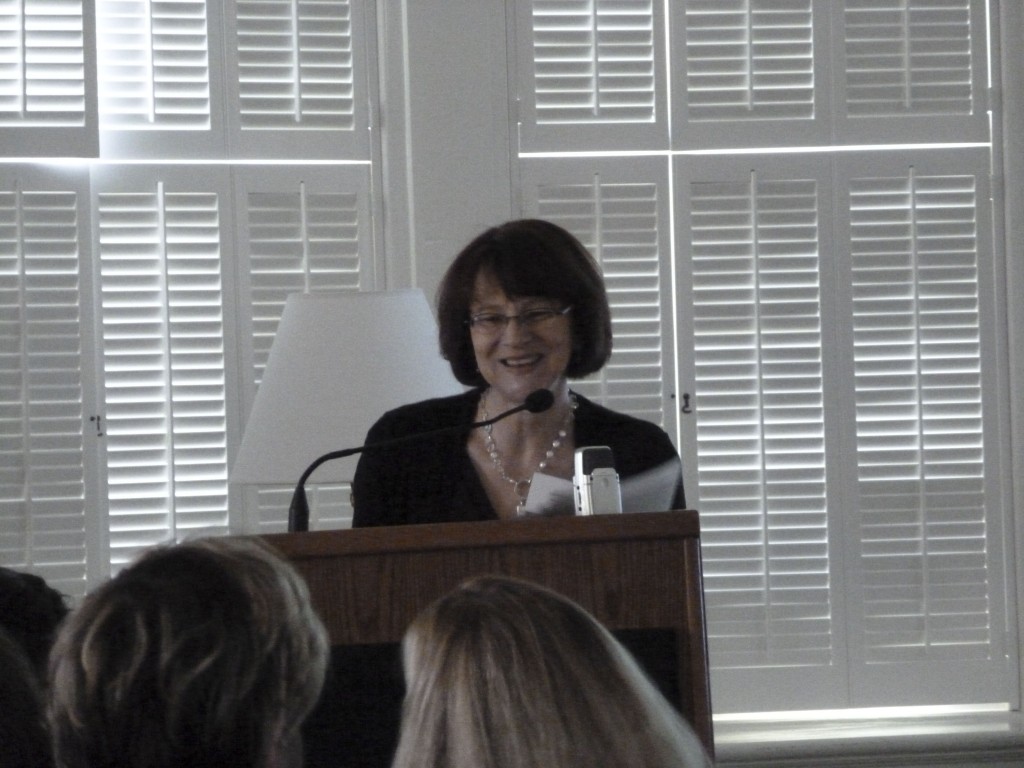
Keynote speaker Professor Laura Mandell, Director of the Initiative for Digital Humanities, Media, and Culture and Professor of English at Texas A&M
The conference opened on Friday afternoon with a provocative and inspiring keynote by Laura Mandell of Texas A&M, “Feminist Critique vs. Feminist Production in Digital Humanities.” The talk advocated that those whose work seeks to recover marginalized histories and perpetuate them in digital form must actively produce new work that embodies criticism, rather than only publishing critiques of existing work. Her speech raised several points that served as touchstones throughout the weekend for the attendees and presenters, many of whom are currently grappling with the challenge of giving digital presence to marginalized voices. How does the modern scholar produce work that is compatible enough with mainstream practices to guarantee visibility and sustainability, without undermining the ways in which these stories deviate from the mainstream? Her talk will be made available shortly on the conference website so please keep an eye on this site for more content.
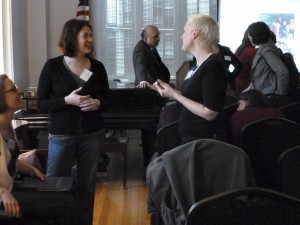
Conference attendees converse after the keynote on Friday March 22nd at Wyndham Alumnae House, Bryn Mawr College
The conference was a forum for many rich conversations, and thanks to Twitter you can follow the discussions by searching the official conference hashtag #WHDigWrld. Conference participant Professor Michelle Moravec (@ProfessMoravec), Rosemont College, created a Storify of the Tweets and a blog on her reflections about the conference. Nancy Rosoff (@NancyRosoff), Arcadia University, has also written a blog post about the conference including excerpts from her paper. We are encouraging all presenters to upload information to the conference website which uses the Bepress software, acting as a repository and an archive of the conference.

Bryn Mawr College undergraduate Lianna Reed ’14 helped at the conference. She’s pictured here at the registration desk in Thomas Hall, the venue for the second day of the conference.
Conference panels were held all day on Saturday March 24th related to the four panel session overarching themes: Pedagogy: Digital Sources and Teaching in Women’s History; Developments in Digital Women’s History; Digital Archives and Practices and finally, Culture and Representation in the Digital World.
The conference ended with a roundtable with participation from Cheryl Klimaszewski, Digital Collections Specialist, Bryn Mawr College, Cathy Moran Hajo, Ph.D., Associate Editor/Assistant Director, The Margaret Sanger Papers Project, New York University, Christine A. Woyshner, Ed.D., Professor of Elementary Education /K-12 Social Studies, Temple University and moderated by Jennifer Redmond, Director of The Albert M. Greenfield Digital
Center for the History of Women’s Education, Bryn Mawr College. Topics that arose included the difficulties in funding and sustaining funding for digital humanities projects related to women’s history; what a digital humanities ‘toolkit’ should look like for those interested in developing their skills; funding opportunities and potential collaborations between the conference participants and the importance of networking, sharing information and collaborating with each other.
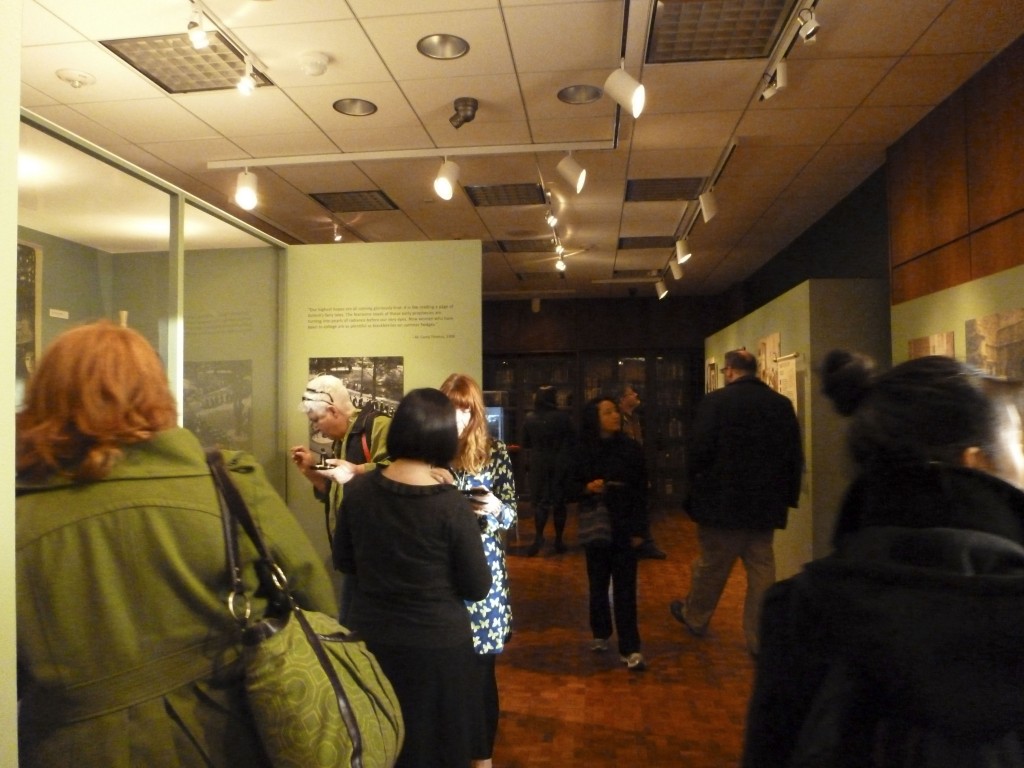
The closing reception at the conference was held in the Rare Book Room Gallery, Canaday Library, Bryn Mawr College. Conference participants were able to wind down and explore the Taking Her Place exhibition, curated by The Albert M. Greenfield Digital Center for the History of Women’s Education.
The conference ended with a reception at the Rare Book Room Gallery to view the Taking Her Place exhibition, co-curated by Evan McGonagill and Jennifer Redmond of The Albert M. Greenfield Digital Center for the History of Women’s Education. This exhibition, which runs until June 2nd 2013, harnesses many of the themes of the conference as it includes digital elements as well as traditional archival material on the history of women’s education. If you have not yet visited the exhibition, please do so! Direct any questions you have about it to greenfieldhwe@brynmawr.edu and don’t forget to follow us on Twitter @GreenfieldHWE for further updates on the exhibition program. We have also uploaded a splash of photos from the event to our Tumblr.
The conference organizers would like to thank their sponsors, The Albert M. Greenfield Foundation and the Tri-Co Digital Humanities Initiative for their support. We would also like to thank Camilla McKay, Head of Carpenter Library, Bryn Mawr College, for her support in creating the conference website and Lianna Reed ’14 for her support at the registration desk. Finally, we would like to thank all the presenters and participants who made this such a fantastic and vibrant conference – we look forward to welcoming you again in 2014!

